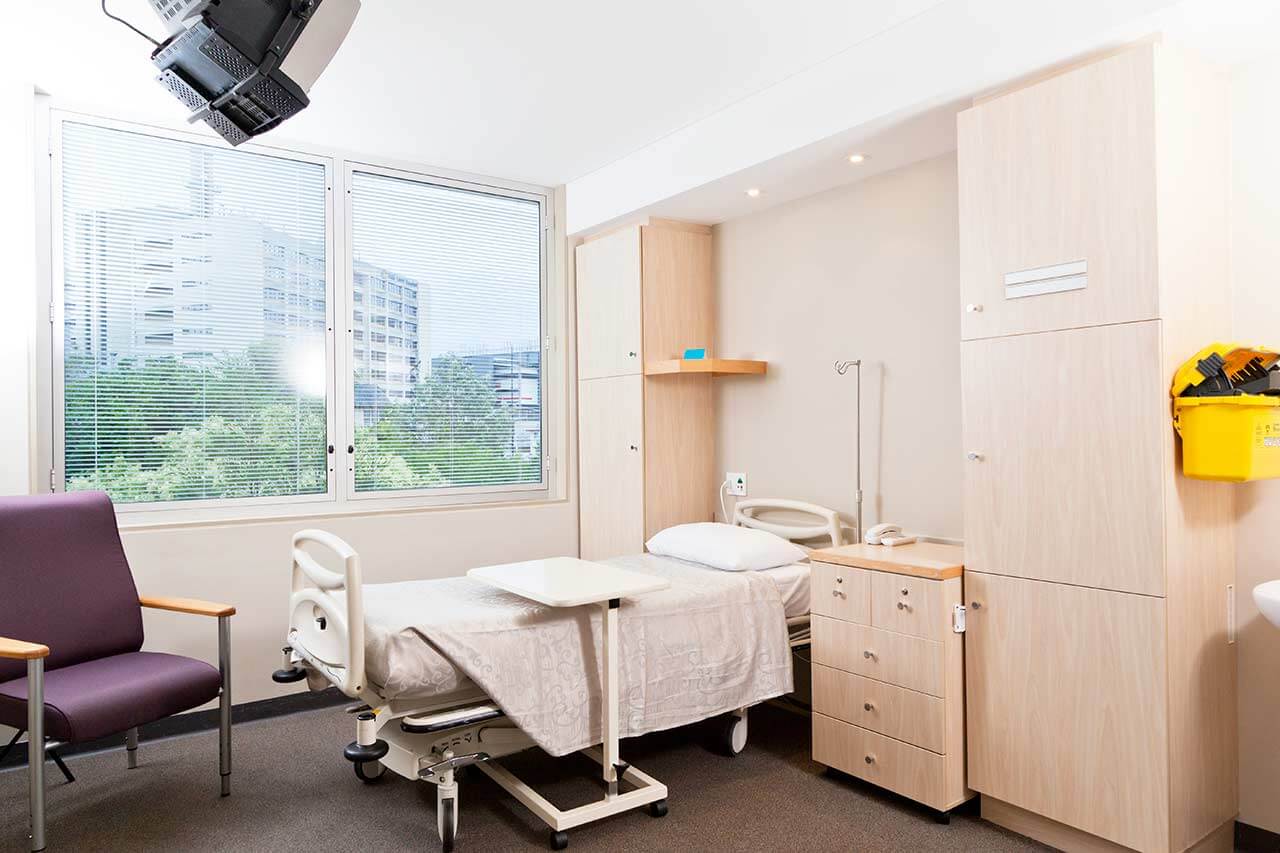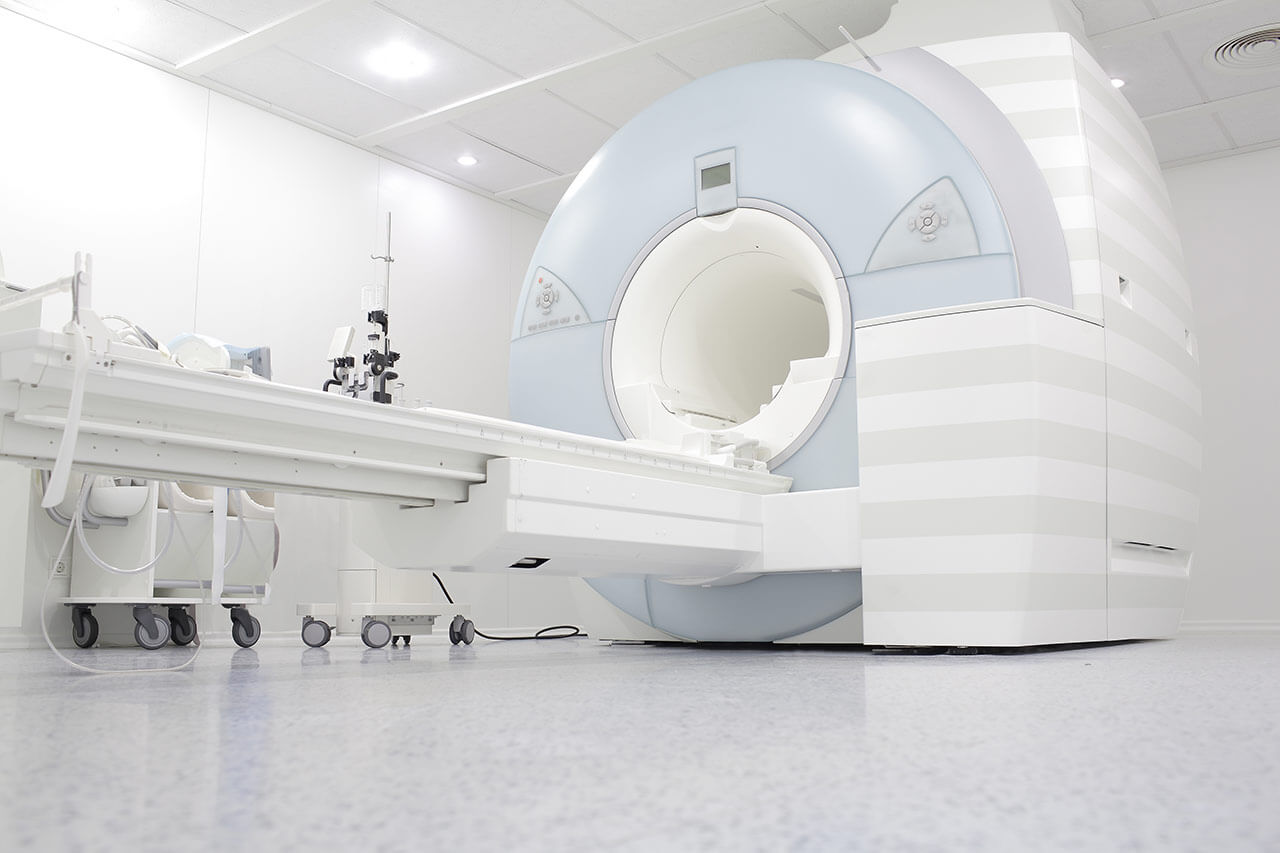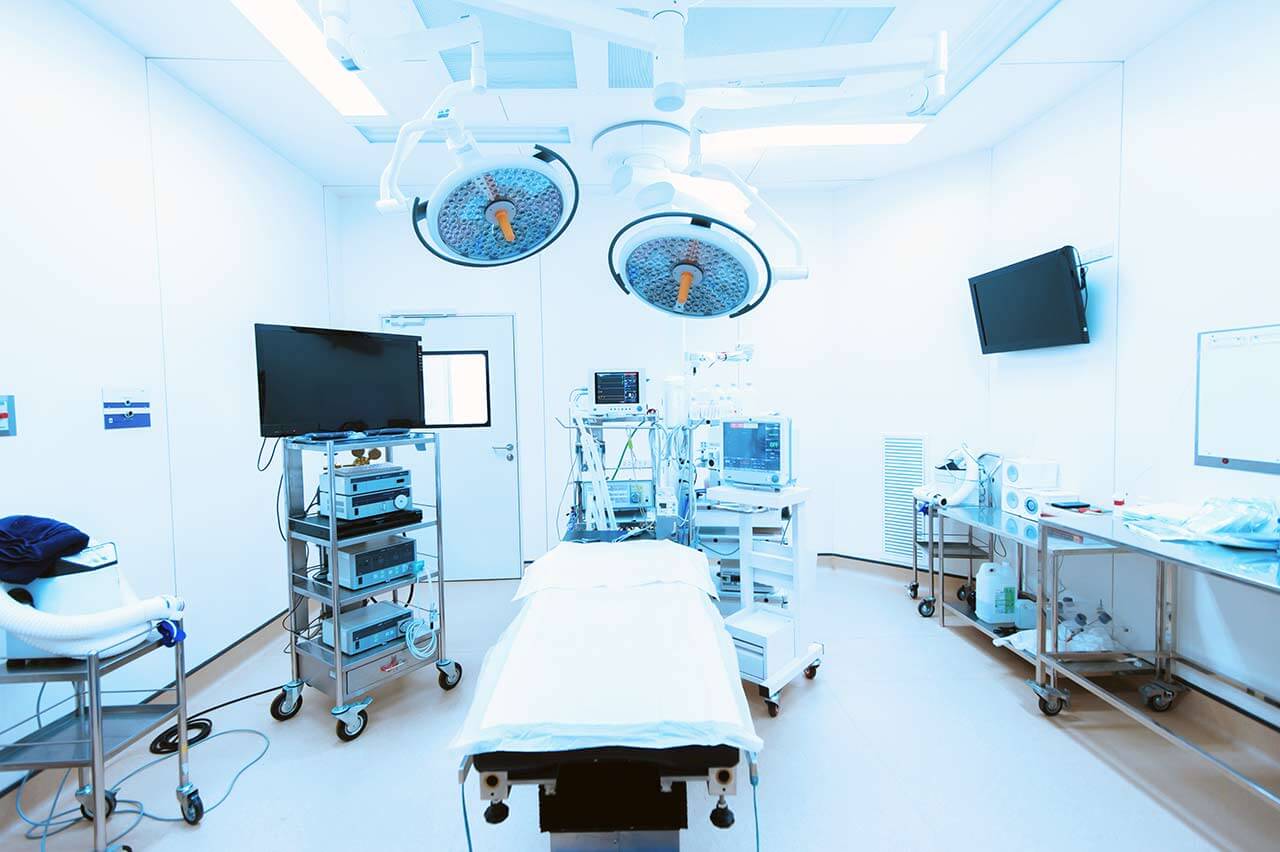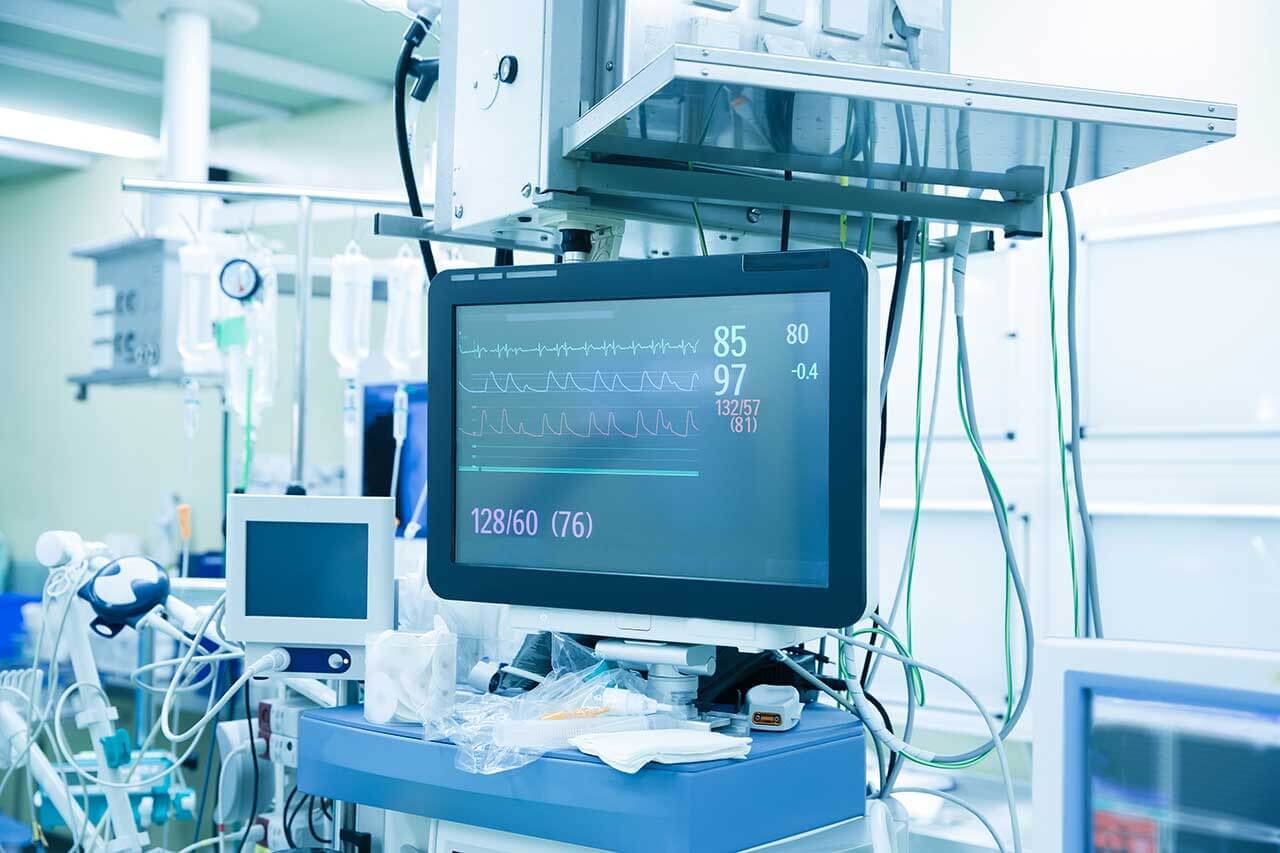
The program includes:
- Initial presentation in the clinic
- clinical history taking
- review of medical records
- physical examination
- neurophysiological examination
- laboratory tests:
- complete blood count
- inflammation indicators (CRP, ESR)
- abdominal ultrasound
- colonoscopy (on indication 1000 €)
- nursing services
- consultation of related specialists
- consultation of the chief physician and all leading experts
- development of individual treatment plan
- written statement
Required documents
- Medical records
- Anal sphincter ultrasound (if available)
- Pelvic MRI (if available)
Service
You may also book:
 BookingHealth Price from:
BookingHealth Price from:
About the department
The Department of Adult and Pediatric General, Abdominal, Hepatobiliary, Endocrine, Thoracic and Hernia Surgery at the University Hospital Rechts der Isar Munich offers the full range of services in these fields. The team of the department's surgeons is rightfully proud of their high professionalism and successfully performs operations of varying degrees of complexity for diseases of the thyroid and parathyroid glands, stomach, esophagus, intestines, pancreas, liver, biliary tract, lungs. The medical facility also performs surgery for inguinal, umbilical and incisional hernias. The department has four high-tech operating rooms equipped with advanced surgical instruments, computer systems, devices for intraoperative ultrasound scanning, radiography, etc. Whenever possible, the department's surgeons perform low-traumatic laparoscopic procedures, after which patients need to spend only a few days in the hospital. The department has 100 beds for patient hospitalization.
The Head Physician of the department is Prof. Dr. med. Helmut Friess. According to the Focus magazine, the professor ranks among the top German doctors specializing in abdominal surgery and surgical treatment of gastrointestinal cancer.
The department is a certified Colon and Pancreatic Cancer Center (certification of the German Cancer Society), part of the certified Cancer Center of the University Hospital Rechts der Isar Munich. In addition, the department is recognized as the Center of Excellence for Pancreatic Surgery (German Society for General and Abdominal Surgery). All these achievements indicate that the department provides high quality treatment at the highest technical and professional level.
In the field of general and abdominal surgery, the department's doctors most often perform operations for diseases of the stomach, bowel and esophagus: stomach ulcers, internal bleeding, gastroesophageal reflux disease, inflammatory bowel disease, intestinal obstruction, intestinal, stomach and esophageal malignancies. The operation is the last-line therapy, and therefore the department's doctors carefully study the results of the patient's examination, assess the risks and benefits of the operation, and then offer the patient possible treatment options. In most cases, surgical interventions on the stomach, intestines and esophagus are performed using sparing minimally invasive techniques that exclude extensive skin and soft tissue incisions, which ensure a rapid recovery after the intervention.
The department's hepatobiliary surgeons perform surgical treatment of liver, gallbladder and biliary tract diseases. Surgery to resect benign and malignant liver neoplasms are successfully performed in the department's operating rooms. When performing the intervention, the surgeon removes the tumor and the affected adjacent tissues or even part of the liver. Gallbladder and biliary tract surgery is most often performed to remove calculi in these organs.
An important area of work for the team of surgeons of the medical facility is the surgical treatment of endocrine disorders: thyroid and parathyroid gland diseases. In most cases, partial resection or total removal of these endocrine glands are indicated to patients, after which they receive hormone replacement therapy.
In the field of hernia repair surgery, the department's specialization includes surgical procedures for umbilical, inguinal and incisional hernias. Hernioplasty is performed using minimally invasive techniques, so the patient does not require long-term hospitalization. In most cases, special meshes are used to correct the protrusion of tissues and internal organs of the abdominal cavity beyond its limits, which help to eliminate the hernia and prevent its recurrence.
The department's surgical options are complemented by thoracic surgery. Of key interest is the resection of lung tumors and lung metastases. The department's specialists prefer modern surgical techniques – video-assisted thoracoscopic surgery. Such surgical interventions do not require thoracotomy, which is associated with high risks to the patient's health. In addition, the patient does not experience severe pain and can leave the hospital as soon as possible.
The department's range of medical services includes:
- General and abdominal surgery
- Surgery for stomach, bowel and esophageal diseases, including innovative therapies against cancer: hyperthermic intraperitoneal chemotherapy (HIPEC) and treatment using the NanoKnife system
- Appendectomy
- Cholecystectomy
- Hepatobiliary surgery
- Hepatobiliary surgery for liver, gallbladder and biliary tract diseases
- Endocrine surgery
- Surgery for thyroid and parathyroid diseases
- Thoracic surgery
- Surgery for lung tumors and lung metastases
- Hernia surgery
- Surgery for inguinal, umbilical and incisional hernias
- Other surgical options
Curriculum vitae
University Education and Postgraduate Training
- 1982 - 1988 Faculty of Medicine, Ulm University, Ulm, Germany.
- 1990 Thesis: "The role of gastrointestinal hormones in adaptation of the pancreas after gastrectomy", Ulm University, Germany.
- 1998 Habilitation: "Growth factors and growth factor receptors in pancreatic cancer", University of Bern, Switzerland.
- 2003 Professor, Pancreatic Surgery and Pancreatic Molecular Research, Heidelberg University, Germany.
Professional Career
- 1988 - 1991 Internship, Department of General Surgery, University Hospital Ulm.
- 1991 - 1992 Postdoctoral Fellow, Department of General Surgery, University Hospital Ulm.
- 1992 - 1993 Postdoctoral Fellow, University of California, Irvine, USA, Department of Medicine and Biological Chemistry.
- 1993 - 1996 Resident, Department of General and Transplant Surgery, University Hospital Bern.
- 1996 - 2001 Surgeon, Department of General and Transplant Surgery, University Hospital Bern.
- 2001 - 2007 Deputy Head, Department of General and Abdominal Surgery, Traumatology at the University Hospital Heidelberg.
- Since 07.2007 Head of the Department of Adult and Pediatric General, Abdominal, Hepatobiliary, Endocrine, Thoracic and Hernia Surgery at the University Hospital Rechts der Isar Munich.
Awards and Prizes
- 2005 Dr. Hella Bühler Prize for Research in Oncology, Heidelberg University.
- 2003 Ethicon Prize, CAMIC.
- 2003 Winner of the Feldbausch Foundation Prize, Heidelberg.
- 2002 Honorable Mention of the Federal State of Baden-Wuerttemberg.
- 1999 Fritz Linder Prize.
- 1997 Young Investigator Award (Scholarship), European Pancreatic Club.
- 1996 Award for Research in Surgery, Swiss Society of Surgery.
- 1996 Award for Best Fundamental Scientific Presentation, European Pancreatic Club.
- 1994 Young Investigator Award (Scholarship), European Pancreatic Club.
Memberships in Professional Societies
- 1990 German Society of Surgery.
- 1990 Professional Association of German Surgeons (BDC).
- 1991 European Pancreatic Club (EPC).
- 1995 German Society of Gastroenterology, Digestive and Metabolic Diseases (DGVS).
- 1996 Pancreas Club.
- 1995 European Digestive Surgery (EDS).
- 1995 New York Academy of Sciences.
- 1996 American Pancreatic Association (APA).
- Society for Surgery of the Alimentary Tract (SSAT).
- 1996 International Association of Pancreatology (IAP).
- 1999 European Society for Surgical Research (ESSR).
- 2003 European Surgical Association (ESA).
- 2003 International Hepato-Pancreato Biliary Association (IHPBA).
- 2003 German Society of Abdominal Surgery (DGVC).
Photo of the doctor: (c) Klinikum rechts der Isar der Technischen Universität München
About hospital
The University Hospital Rechts der Isar Munich was founded in 1834. It combines long traditions with the very latest advances in modern medicine. The medical facility includes 33 specialized departments and 20 interdisciplinary centers, where patients can receive top-class medical care in all medical fields.
The hospital annually admits more than 65,000 inpatients for diagnostics and treatment, and about 250,000 outpatients receive effective medical care. The hospital also performs more than 40,000 surgical procedures every year, and about 2,100 babies are born here annually. One of the most significant achievements of the medical facility can be called the first transplantation of both arms above the elbow performed in 2008. The surgery that lasted 15 hours, and in which 40 doctors of various medical specialties took part, became a real sensation in the scientific world. Thanks to a unique surgical procedure, the doctors managed to give the patient new hands.
In addition, the employees of the hospital are actively involved in research activities, in which they study various diseases, as well as develop new therapeutic options for their treatment. It should be noted that the research institutes of the hospital are among the most reputable research organizations in the world. A striking example can be considered the Roman Herzog Comprehensive Cancer Center, whose specialists cooperate closely with the Comprehensive Cancer Center Munich in order to find new treatment methods for cancers.
The university hospital has a strict quality management system to maintain a high level of patient care. Since 2011, the hospital has been certified in accordance with DIN EN ISO 9001:2015 at the national and international level. The medical facility was also recertified by TÜV Rheinland in 2020.
The hospital annually provides medical services not only to German citizens, but also to thousands of patients from different countries of the world. This indicates that the hospital has an excellent reputation in the international medical arena and takes on the most complex clinical cases where other medical centers are unable to help the patient.
Photo: (с) depositphotos
Accommodation in hospital
Patients rooms
The patients of the University Hospital Rechts der Isar Munich live in comfortable single and double rooms with modern design. An accompanying person may stay with the patient in the single room. All patient rooms have an ensuite bathroom with shower and toilet. The furnishings of a standard patient room include an automatically adjustable bed, a bedside table for personal belongings, a table and chairs for receiving visitors, a wardrobe, a telephone and a TV. The patient rooms also have Wi-Fi.
The hospital also has enhanced-comfort rooms, corresponding to the level of a high-end hotel. Such patient rooms have additional amenities: a safe, a mini fridge and upholstered furniture.
Meals and Menus
The patients of the hospital are offered a balanced and healthy three meals a day: breakfast, lunch and dinner. The patients have a choice of three different menus for lunch – a classic full menu, as well as a dietary and vegetarian one. When cooking meals, the chefs comply with the current recommendations of the German Society for Nutritional Medicine (DGEM) and the German Nutrition Society (DGE).
If for some reason you do not eat all the foods, you will be offered an individual menu. The hospital also houses a cafeteria with a large assortment of hot and cold drinks, snacks and desserts.
Further details
Standard rooms include:
Religion
Religious services are available upon request.
Accompanying person
Your accompanying person may stay with you in your patient room or at the hotel of your choice during the inpatient program.
Hotel
You may stay at the hotel of your choice during the outpatient program. Our managers will support you for selecting the best option.
The hospital offers a full range of laboratory tests (general, hormonal, tests for infections, antibodies, tumor markers, etc.), genetic tests, various modifications of ultrasound scans, CT scans, MRI and PET / CT, angiography, myelography, biopsy and other examinations. Treatment with medications, endoscopic and robotic operations, stereotaxic interventions is carried out here, modern types of radiation therapy are also used. The hospital offers patients all the necessary therapeutic techniques.
- CAR T-cell therapy
- Autologous and allogeneic bone marrow transplantation
- Transcatheter aortic valve implantation (TAVI)
- Radical and organ-preserving interventions for kidney cancer
- Iridoplasty and iridotomy with Nd-YAG laser
These are acute and chronic leukemias, solid malignant tumors, heart failure, cardiac arrhythmias, heart valves stenosis and insufficiency, vasculitis, benign prostatic hyperplasia, pathologies of retina and vitreous body, Guillain-Barré syndrome, myasthenia gravis and other pathologies.
- Hematology and oncology
- Cardiology
- Nephrology
- Urology
- Ophthalmology
Over 877 highly qualified physicians work at the hospital.






